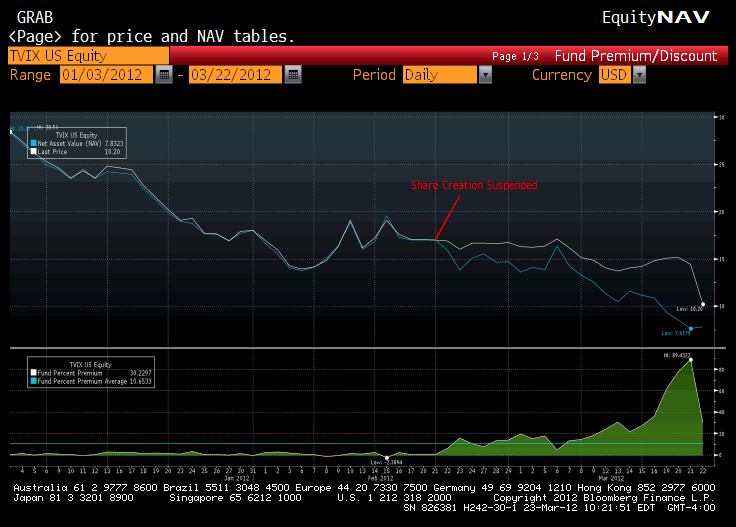TVIX and the VIX – Problem was Feb 21, not yesterday
So TVIX became the ETN story of the day yesterday, but the reality is it should have become “ETN” story of the day a on February 21st when Credit Suisse suspended the creation of more shares.
 Up until that day, TVIX tracked NAV closely. If it was trading too rich or too cheap, some investors would have put on the “arb” and ensured that TVIX stayed close to its NAV. When CS cancelled the ability to create more shares, the opportunity for TVIX to trade “rich” was created because the arbs couldn’t create shares in order to keep the NAV’s aligned in that direction. The fact that very quickly, TVIX shares became almost impossible to borrow, meant the arbs couldn’t attempt to put the trade on that way either.
Up until that day, TVIX tracked NAV closely. If it was trading too rich or too cheap, some investors would have put on the “arb” and ensured that TVIX stayed close to its NAV. When CS cancelled the ability to create more shares, the opportunity for TVIX to trade “rich” was created because the arbs couldn’t create shares in order to keep the NAV’s aligned in that direction. The fact that very quickly, TVIX shares became almost impossible to borrow, meant the arbs couldn’t attempt to put the trade on that way either.
So the effect was that the premium to NAV that TVIX was trading at grew and grew. It went from trading like an ETN to trading like a closed end fund, at a significant premium. So the main problem wasn’t yesterday, but the days leading up to yesterday. The SEC should scrutinize closely any time an ETN stops share creation or redemption.
This problem was amplified by the fact that clearly someone knew CS was going to allow share creation yesterday ahead of the official announcement. Insider trading?
So the real problems with TVIX occurred over time and were a direct result of no share creation rights, and no borrow. It had little if anything to do with fact that it was leveraged ETN or used futures – though clearly the size of the ETN had gotten too big relative to the underlying market, or else CS would not have had to stop creation rights.
What is truly strange, and says something about the psyche of the market and the media, is that no one seemed to care when it was trading rich, but because the price fell, suddenly people cared? The falling price was a reflection of the ETN returning to fair value, yet many people seem more concerned by that move, than the real problem, that the price had stayed high for too long! Making it an even more strange, is many of the market cheerleaders are now up in arms over the decline in value of a product that typically performs best in a down market.
